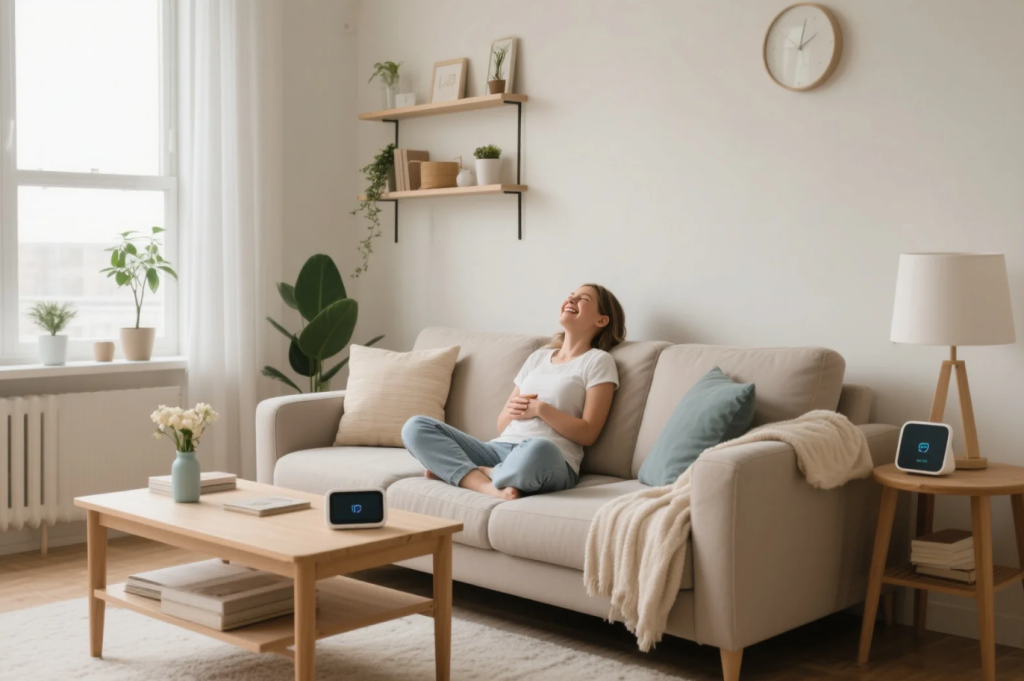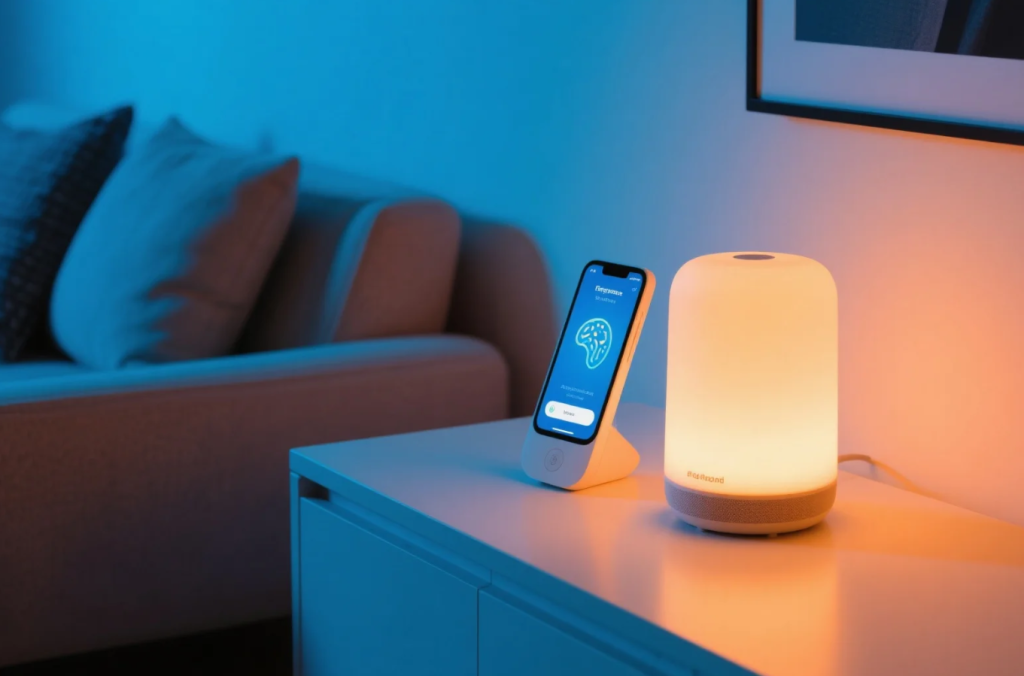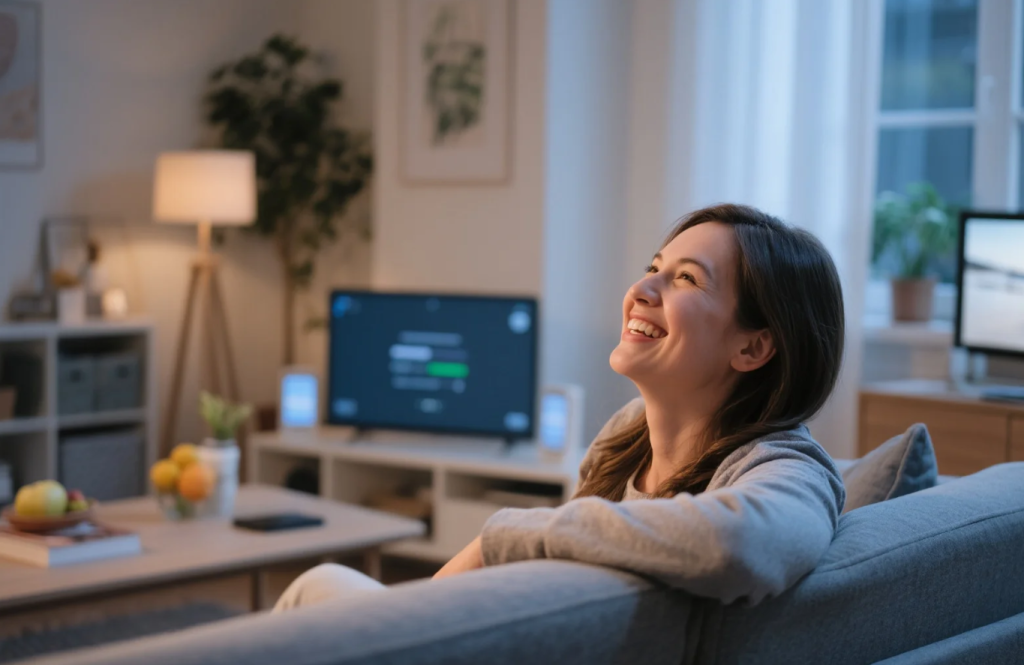When we talk about smart homes, we often celebrate convenience, efficiency, and security. But there’s a quieter, more profound revolution happening behind the blinking lights and sleek apps: the impact of smart technology on your well-being.
In a world of burnout, blue light, and back-to-back Zoom meetings, the modern home is no longer just a place to sleep—it’s a sanctuary. And with smart tech, that sanctuary can be deeply attuned to your mental and emotional needs.
Welcome to the softer side of the smart home revolution.
1. The Mood-Matching Light That Knows You Better Than Your Therapist
Lighting affects everything—your sleep, your focus, even your mood. But we rarely think about it consciously.
Smart lighting systems like Philips Hue or Nanoleaf allow you to control brightness and color temperature in tune with your natural rhythms. You can wake up to energizing cool light, work under crisp daylight tones, and relax at night with soft amber hues that mimic sunset.
Some systems even auto-adjust throughout the day based on circadian science. This isn’t just ambiance—it’s neurobiology.
Studies show that proper lighting can reduce anxiety, combat seasonal affective disorder (SAD), and improve sleep. A smart home, quite literally, lights the way to better mental health.
2. Silence Is Golden—And Programmable
Noise pollution isn’t just annoying—it’s stressful. From city sirens to refrigerator hums, our brains are bombarded constantly.
Smart home systems can help you reclaim quiet:
- Smart noise-canceling windows or panels that adapt to ambient sound levels.
- White noise routines triggered at bedtime by your smart assistant.
- Smart speakers programmed to play calming nature sounds at times of peak stress (e.g., during work breaks or after your commute).
Even smart air purifiers contribute by reducing the subtle but stressful background noise from low-quality appliances.
Peace of mind begins with peace and quiet.
3. The Power of “Digital Feng Shui”: Spatial Well-Being
There’s an entire field called neuroarchitecture—the study of how your surroundings affect your brain.
Smart homes allow you to create dynamic, responsive spaces tailored to how you feel:
- Feeling drained? Activate a “refresh” mode: brighter light, energizing music, crisp air.
- Overwhelmed? One command dims the lights, plays ocean waves, lowers the thermostat, and brews calming tea via a smart kettle.
Unlike traditional Feng Shui, this isn’t about lucky bamboo—it’s about real-time environmental control that speaks directly to your nervous system.
4. Routine Automation = Cognitive Relief

Decision fatigue is real. Every day we make thousands of micro-decisions—what to wear, eat, clean, turn off, lock up.
Smart homes eliminate hundreds of these by automating them:
- Morning coffee brewed automatically at 7:15.
- Curtains open with sunrise.
- Thermostat adjusts without you lifting a finger.
- Robot vacuum cleans while you’re in meetings.
Each automated moment is one less task for your brain. The result? Less stress, more bandwidth for creativity, focus, and joy.
Your home becomes a co-pilot, not a checklist.
5. Emotional Support… from a Voice Assistant?
We joke about it, but there’s surprising evidence that talking to your smart assistant—yes, even casually—can positively impact emotional regulation.
A study published in Computers in Human Behavior found that people who regularly interacted with AI assistants reported less loneliness and greater feelings of control.
Want to go a step further? Many smart home platforms now integrate mindfulness apps:
- Ask Alexa or Google to guide a meditation.
- Trigger a “breathe” mode: dim lights, soft chimes, gentle reminder to pause.
- Set up gratitude journaling prompts each night via smart reminders.
It’s not therapy—but it is thoughtful support.
6. Sleep Smarter, Wake Happier
Sleep is the foundation of mental health, and smart homes are changing how we sleep:
- Smart mattresses and sleep trackers monitor patterns, temperature, and heart rate.
- Smart curtains block out light on a schedule or based on sunrise.
- Smart thermostats optimize the room for sleep: cooler at night, warmer in the morning.
- Sleep sounds (rain, forest, fireplace) can play automatically when you say, “I’m going to bed.”
The results? Better sleep hygiene, fewer nighttime disruptions, and a more refreshing morning.
Even better: your home learns your patterns and optimizes them over time.
7. Emotional Safety Through Smart Security
You might not think of mental wellness when you install a smart lock—but security is foundational to emotional health.
Constant low-grade anxiety about break-ins, packages, or strange noises wears on you. Smart security systems—cameras, locks, sensors—don’t just protect your home. They give you control.
Even small features matter:
- Doorbell cameras show who’s at the door without the cortisol spike.
- Motion alerts let you check in, then relax knowing everything’s fine.
- Smart locks mean no late-night “Did I lock the door?” panic.
A calm mind starts with a safe space.

8. Emotional Wellness for the Whole Family
Smart home tech isn’t just for solo adults. It can create emotionally intelligent spaces for everyone:
- Soothing smart lighting in children’s rooms to help with bedtime anxiety.
- Family reminders set by voice: “Don’t forget to hug Mom today!” 🧡
- Shared calendars and voice memos that reduce family tension.
- Teens benefit from routines that encourage screen breaks, healthier sleep, or even reminders to hydrate.
Your home can become a family therapist in disguise—quietly encouraging healthier interactions and habits.
9. The Ritual of Return: Your Home Welcomes You
One of the most subtle yet profound mental health features of smart homes is the “welcome back” ritual.
You walk through the door. The lights come on to your preferred level. Your favorite playlist starts. The room is already at the perfect temperature. The oven is preheating. The scent diffuser releases calming lavender.
You exhale.
This feeling—that your space is glad you’re back—is deeply affirming. Smart tech can turn a house into a haven in seconds.
Smart Homes Are Emotional Architects
It’s time we stopped thinking of smart homes as cold, robotic systems. When thoughtfully designed, they’re emotionally intelligent ecosystems that understand, respond to, and support the humans who live in them.
In the end, the smartest home isn’t the one with the most devices. It’s the one that helps you:
- Breathe more deeply
- Sleep more soundly
- Work more clearly
- Love more fully
- And live more freely
Smart home. Smart you. Happy life.


